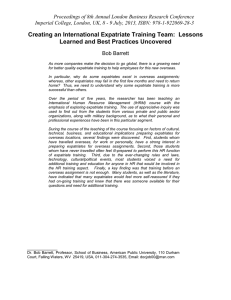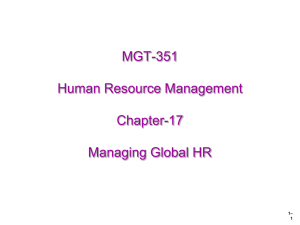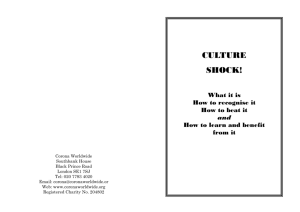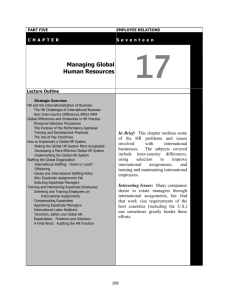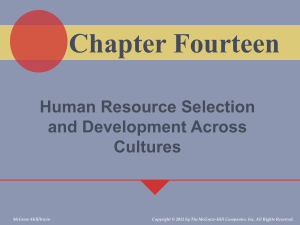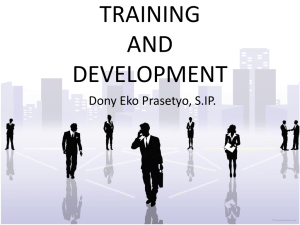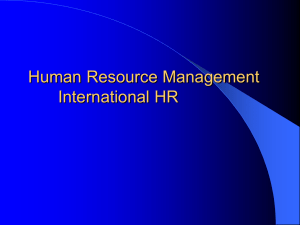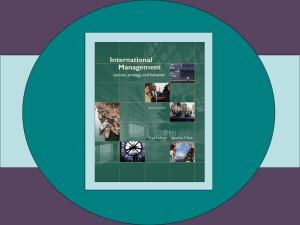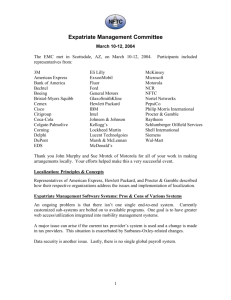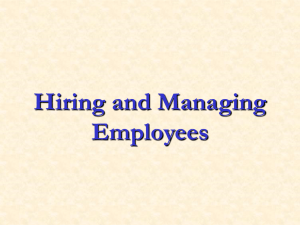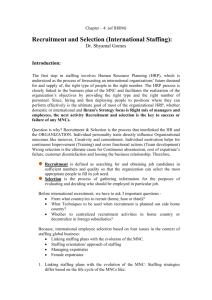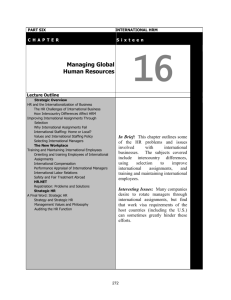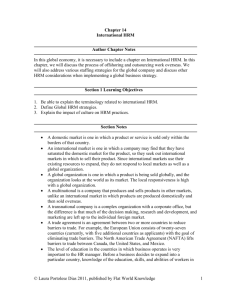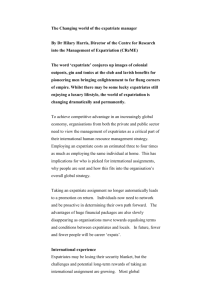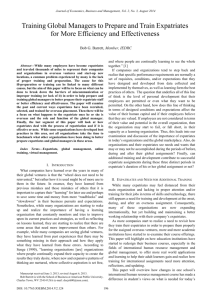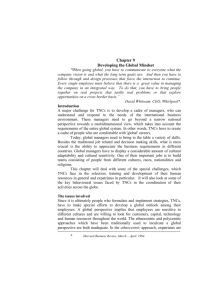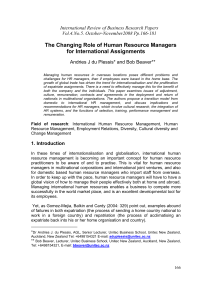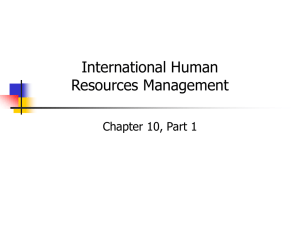training - Management Class
advertisement
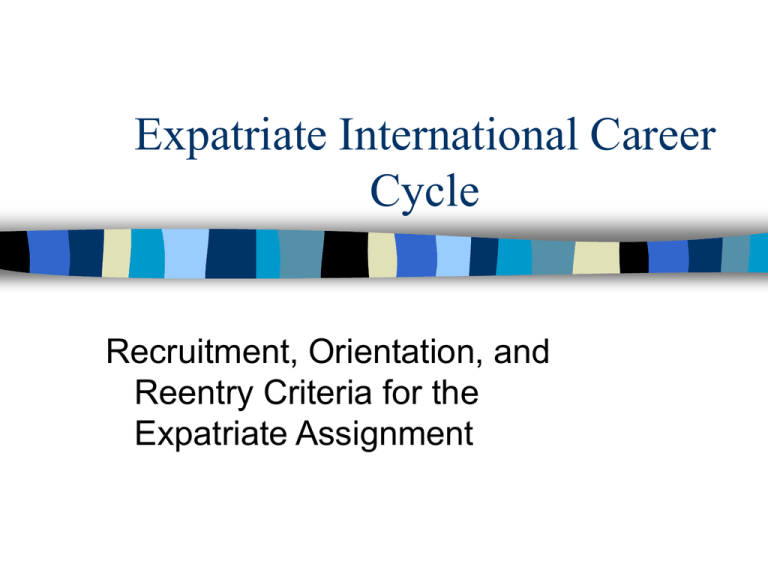
Expatriate International Career Cycle Recruitment, Orientation, and Reentry Criteria for the Expatriate Assignment Cross-Cultural Studies Focus on: Behavior of employees; Trains people to work in a multi-cultural environment ; Describes and compares organization behavior across cultures; and Outlines ways to interact within a multicultural workforce. Definition of Culture: Something that is shared by all or almost all members of some social group; Something that the older members of the group try to pass on to the younger members; and Something (e.g., morals, laws, customs) that shapes behavior, or structure’s one’s perceptions of the world. Six Dimensions of Cultural Orientations in Societies Individuals Relationship to nature and the world Relationship to other people Activity: “Doing” or “Being” Orientation in time Orientation in space Source: Nancy J. Adler Edward Hall: High Context Culture Low Context Culture How much information is enough? Space Territoriality Personal space Multisensory spatial experience Time Monochronic Do one thing at a time Time commitments? Low-Context Rules of privacy Respect for property S-t relationships Follow plans Polychronic Do many things at once Are highly distractible Time commitments? High-context Relationships Change plans Stages of Expatriate International Career Cycle Home Country Assignment Recruitment Selection Orientation Foreign Country Assignment Debriefing Reentry Return Typical First-Year Cost of a U.S. Expatriate (Married, Two Children) in Tokyo, Japan Direct Compensation Costs: Base Salary $100,000 Foreign Service Premium 15,000 Goods and Services 73,600 Less: U.S. Housing Norm (15,400) U.S. Taxes (17,200) Company-Paid Costs: Schooling (two children) Annual Home Leave Housing Japanese Income Taxes Transfer/Moving Costs Total Company Costs $ 15,000 4,800 150,000 84,000 38,000 $447,800 Selection Criteria for the International Assignment (Gonzalez and Negandhi) The study surveyed 1,161 U.S. Expatriates in 40 Countries Survey asked expatriates to list the ideal background for an overseas career Ideal Background for an Overseas Career: Adaptability of the Family Leadership Ability Knowledge of the Job Knowledge of the Host Country Well-educated Respect for Foreigners 20% 19% 14% 13% 13% 12% Ideal Background for an Overseas Career: Previous Overseas Experience Desire to Serve Overseas Miscellaneous Total 4% 4% 1% 100% Desirable Skills and Attributes: Technical Competence Written and Verbal Competence Common Sense Assertiveness People-Oriented Fair Energetic Sense of Humor Source: Stephen Heumann, The West Co. Educational Background: Broad-based course of study Liberal arts blended with technical skills Foreign language Travel Understanding cultural and religious differences Reading foreign journal/newspapers Source: Stephen Heumann, The West Co. Are You Right for the Job Outside of the U.S. ? Do I have the necessary skills for the position? Does my family favor living overseas and are we able to adapt to new situations? Is our current family life stable? If a family member has a health problem, can it be treated in the host country? Are You Right for the Job Outside of the U.S.? Will this experience provide general career advancement? Where will I be when we return home? Will I have an immediate position with my sponsor or another organization? Since many expatriate spouses are not able to get work permits, is my spouse willing to interrupt a career? Are You Right for the Job Outside of the U.S.? Does my firm offer sufficient support and financial compensation to expatriates? Selection Methods: Tests: California Test (the indirect scale of ethnocentrism) Personal Interviews Assessment Centers Training Techniques for Expatriate Preparation: Informational Training: Lectures, Reading Material, Video Tapes Overall Purpose: Area Studies Experiential Workshops Cultural Assimilator, Role Playing Overall Purpose: Learning via experience Training Techniques for Expatriate Preparation: Sensitivity Training: Communication Workshops, Outward Bound Trips Overall Purpose: Communication style, empathy, and listening skills Language Skills: Classes, Tapes Overall Purpose: Interpersonal communication Training Techniques for Expatriate Preparation: Field Experiences: Meeting with former expatriates, short-term visits to host country Overall Purpose: Customs, values, non-verbal communication skills Source: S. Ronen, “Training the International Assignee,” in Training and Career Development, 1st edition, San Francisco: Jossey-Bass, 1989, p. 438) Ten Ways to Prepare for the Overseas Assignment: 1. 2. 3. 4. 5. 6. Read and Learn About the Culture. Learn the Language. Study Maps. Practice the Currency. Learn Measurements. Meet Someone from the Host Country. Ten Ways to Prepare for the Overseas Assignment: 7. Talk to someone who has been there. 8. Prepare as a Family. 9. Arrange Good-Byes. 10. Take What You Need to Make a Home. Source: Copeland and Griggs, Going International Four Stages of Culture Shock: Initial Euphoria Irritation and Hostility Adjustment Reentry--Reverse Culture Shock Ten Ways to Cope When the Going Gets Rough: 1. 2. 3. 4. 5. 6. 7. Review and Renew. Look for the Local Logic. Make a Friend. Avoid Complaining Americans. Do Not Neglect Your Partner. Use the Time. Do Not Deny Reality When Things Are Bad. Ten Ways to Cope When the Going Gets Rough: 8. Do Not Make Comparisons With Home. 9. Do Not Get Hung Up on Being Liked. 10. Be Careful About the Culture Shock Cures You Choose. Source: Copeland and Griggs, Going International Three DCs as a Rule of Thumb: Do not Compare Do not Complain Do not Criticize Source: Infogram, The International Family, David M. Kennedy Center for International Studies Why U.S. Employees Fail in Foreign Assignments: Inability of the manager’s spouse to adjust to a different physical or cultural environment; The manager’s inability to adapt to a different physical or cultural environment; Other family-related problems; Why U.S. Employees Fail in Foreign Assignments: The manager’s personality or emotional immaturity; The manager’s inability to cope with the responsibilities posed by overseas work; The manager’s lack of technical competence; and The manager’s lack of motivation to work overseas. The Degree of Reverse Culture Shock Depends On: How long you have been away; Whether you were immersed and comfortable in the host country culture or remained a “visitor”; Whether you had a difficult time adjusting to your host culture; Whether you kept up-to-date on trends and events at home; The Degree of Reverse Culture Shock Depends On: Whether you had a mentor relationship with someone within the “home” organization; and What type of living conditions you experienced or witnessed in the host culture. Source: Infogram, “Coming Home Again,” David M. Kennedy Center for International Studies, Brigham Young University. How to Cope with Reverse Culture Shock: Be prepared to acknowledge that you have changed. Find a mentor within your organization. Communicate often with family and coworkers. Research returning to the home country. Re-adjust your expectations of the “ideal place to live.” How to Cope with Reverse Culture Shock: Do not expect people to listen to your cross-cultural experiences.
